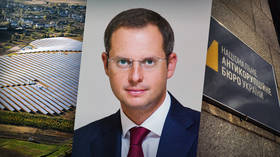US firm at Iraqi base hushed up probe into human trafficking & alcohol smuggling – report
Joint Base Balad, Iraq. © Sgt. Quentin Johnson / Wikipedia
A US firm, paid $686 million to secure an Iraqi base for F-16 fighter jets, ignored security violations, human trafficking allegations and alcohol smuggling by its staff, according to an AP investigation. Those who uncovered the wrongdoing were fired.
The investigation centers on Sallyport Global, which was contracted by the US government to help secure Iraq's Balad Airbase by keeping F-16s and their Iraqi pilots safe.
The $686 million contract also required investigations into potential crimes and contract violations, and for any breaches to be reported to the US government.
However, Robert Cole and Kristie King, the investigators tasked with that job, would soon realize their findings were extremely unwelcome by Sallyport.
The news agency interviewed two former internal investigators who were fired by Sallyport, as well as a half-dozen former or current staff members. It also obtained documents as part of the probe.
Alcohol smuggling
Although alcohol was restricted at the base, Cole and King discovered that staff frequently flew in smuggled alcohol in such large volumes that a plane once “see-sawed” on the tarmac due to the weight.
According to documents and witnesses, alcohol was everywhere on the base. Empty suitcases were reportedly loaded on to Baghdad-bound round-trip flights, returning with booze-filled plastic water bottles which evaded security – a serious risk in a war zone.
Steve Anderson, who worked on flight logistics for Sallyport, said he was told by managers to sign off on manifests he knew had been falsified to hide alcohol and guns.
When he raised concerns, it was suggested that he find a new job. His position was soon eliminated.
In one allegation, informants told the investigators that “flight line” staff responsible for directing airplanes on the runways and handling cargo, were showing up to work drunk. At one point, they reportedly passed around a bowl of gummy bears soaked in vodka.
Prostitution
When Cole and King were aiming to get to the bottom of the alcohol smuggling, they came across a prostitution ring in Baghdad, the customers of which included Sallyport employees, according to informants.
They also learned that four Ethiopians who had previously worked as prostitutes at a hotel had moved to Balad and were plying the same trade while also working as housekeepers for Sallyport.
That investigation, along with the alcohol smuggling probe, was shut down by a Sallyport executive in Virginia before it could continue.
However, Sallyport Chief Operating Officer Matt Stuckart said the prostitution allegations were not substantiated.
“It is absurd to suggest that the company would shut down an inquiry into a matter of such gravity,” he said.
There were also allegations that Sallyport staff members were involved in human trafficking for prostitution.
Theft & security breaches
The AP investigation details an incident which occurred on July 13, 2015, in which a truck driver lost control of his vehicle, taking it onto the tarmac and stopping about 45 yards from a jet in the “no-go area."
Three months later, Cole reported the theft of an armored Toyota SUV assigned to VIPs. His chief suspect was a Sallyport bodyguard. However, the Toyota was recovered within days and Cole was called off the case.
A former senior manager for Sallyport defended taking Cole off the case, telling AP that negotiations with militias were sensitive and needed Iraqi cooperation. Although he said the chief suspect – the bodyguard – was ‘banned’ from the base, Cole later saw him walking around freely.
On November 15, 2016, rogue militia stole three enormous generators using flatbed trucks and a 60-foot (18-meter) crane, driving directly past Sallyport security guards unchallenged.
Despite requirements to report major security breaches, none of the incidents were reported to the US government until earlier this year, after an auditor began asking questions.
‘We knew too much’
After uncovering the information, Cole and King reported it to the correct channels. However, those channels never reported it to the US government and the two investigators were abruptly fired on March 12 and immediately flown out of Iraq.
At the time of their sacking, King and Cole had been looking into allegations that Sallyport manager were falsifying timesheets and people were getting paid without working. They were set to interview those whom they considered to be suspects.
The investigators said company lawyers had ordered them to keep two sets of books at the time, which they believed to be an attempt to deceive auditors.
“One for the government to see and one for the government not to see,” King told AP.
“I feel like they got us out so quickly because they feel like we knew too much,” he said.
King said he and Cole eventually realized that Sallyport was hiding all of the information from the US government, calling the revelation “mind-blowing.”
Meanwhile, Sallyport's COO Stuckart says the company stands by its security procedures and received “high marks” from the US Air Force.
He said the company has a “strong record of providing security and life support services in challenging war zones like Iraq and plays a major but unheralded role in the war against ISIS [Islamic State/IS].”
“The company takes any suggestion of wrongdoing at Balad very seriously,” he added.
Balad Airbase is controlled by the Iraqi government, and has hosted US forces off and on since 2003. The base was evacuated in June 2014, when IS began overrunning Iraqi territory. Sallyport was tasked with keeping the base safe after the Americans returned.


















